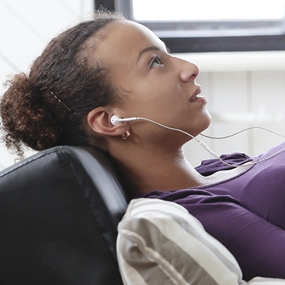Mental wellbeing
Your mental health matters
Mental health can impact a patient's surgical outcome. In this section you will find links to resources and tools to help your patients prepare psychologically for surgery.
Mental health in the perioperative period
The mind-body connection in surgical preparation is crucial and mental health disorders can impact a patient's recovery after surgery, including longer hospital stays and increased postoperative complications. Addressing mental health concerns before surgery is not only about improving comfort, but also about enhancing physical recovery and overall mental wellbeing.
Surgery isn't just a physical ordeal - it's a mental one too. Many people may feel anxiety or stress about having an operation and here are some tips which may help to alleviate any of these feelings:
- Make some time for yourself, be kind to yourself
- Keep active
- Eat healthier foods
- Try to limit any alcohol intake
- Connect and talk with family and friends
- Go outside and enjoy some fresh air
- Meditate and use visualisation and breathing techniques
Supporting patients and their mental health
Below you will find tools and links to resources to help your patients look after their mind and prepare them for surgery.

- The use of mindfulness and hypnotherapy to help prepare your patients for surgery. The RCoA in collaboration with the BSCAH have produced a series of recordings for patients to listen to help them relax before surgery and to develop a positive mindset about their procedure and recovery: Preparing your mind before surgery
- Advice by Medbelle on how best to support you patient's mental health before and after surgery: Mental health before and after surgery
- Blog by Prof Scarlett McNally on why healthcare professionals should help with perioperative mental health.
- Blog by Dr Kumar and Dr Brunning who want to help you get healthy, even before you reach the operating theatre

Tips and techniques on how to manage anxiety before having a procedure

Reducing anxiety in children when they are going for a procedure or surgery.
- The RCoA in partnership with the Association of Paediatric Anaesthetists of Great Britain and Ireland, developed a Beano comic strip to help children understand what it is like to have an anaesthetic and to help reduce any anxiety they may have about surgery: Dennis has an anaesthetic
- Dr Alex Norris covers some key areas that can be improved in everyday practice to help reduce stress and anxiety in a perioperative setting: Reducing paediatric perioperative anxiety.

Social prescribing can help to improve a patient's mental and physical health, by connecting them to local non-medical services and activities.

Poor sleep can be triggered by stressful events and good quality is essential pre- and post-surgery for a successful recovery after surgery (e.g. better wound healing and reduce pain after surgery).

There is a link between what we eat and how we feel.
- A presentation by Professor Felice N Jacka from the Food and Mood Centre, Deaken University: The role of diet in mental and brain health
- A webinar looking at the complexities around diet, gut microbiome and mood disorders: Gut microbiome and mood disorders
- Visit CPOC's page on achieving better nutrition in the perioperative period

Physical activity and exercise can improve our mental health
- An article by the Mental Health Foundation: Physical activity and mental health
- Visit CPOC's page on physical activity and exercise in the perioperative period
- The NHS's Better Health guide: Be active for your mental health

Disclaimer
CPOC has not undertaken a full review of these resources, unless it specifically states CPOC endorsement has been granted. CPOC is simply providing links to these resources.
Click on the link below for additional CPOC patient resources.

